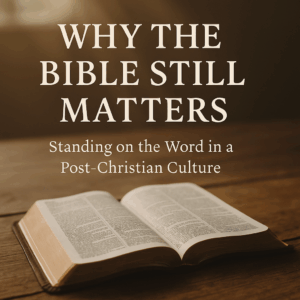⏱️ Estimated Reading Time: 12 min read
Believers are called to holy living. This is the clear teaching of the Bible.
As we continue our series on holiness, we want to consider the question, “How then does the believer cultivate holiness?” We will look at seven different ways.
First, know and love Scripture.
Scripture is God’s primary road to holiness and spiritual growth—with the Spirit as Master Teacher blessing the reading and searching of God’s Word. Jesus prayed, “Sanctify them in the truth; your word is truth” (John 17:17). And Peter advised, “Like newborn infants, long for the pure spiritual milk, that by it you may grow up into salvation” (1 Peter 2:2).
Read through the Bible at least annually. Even more importantly, memorize the Scriptures (Ps. 119:11), search (John 5:39) and meditate upon them (Ps. 1:2), live and love them (Ps. 119; 19:10). Compare Scripture with Scripture; take time to study the Word.
Consider the words of Proverbs 2:1-5:
My son, if you receive my words
and treasure up my commandments with you,
making your ear attentive to wisdom
and inclining your heart to understanding;
yes, if you call out for insight
and raise your voice for understanding,
if you seek it like silver
and search for it as for hidden treasures,
then you will understand the fear of the LORD
and find the knowledge of God.
In this passage, we find the principles of serious personal Bible study: teachability (receiving God’s words), obedience (storing God’s commandments), discipline (applying the heart), dependence (crying for knowledge), and perseverance (searching for hidden treasure).
Do not expect growth in holiness if you spend little time alone with God and do not take His word seriously. When you are plagued with a heart prone to be tempted away from holiness let Scripture teach you how to live a holy life in an unholy world.
Second, consider yourself dead to sin and alive in Christ.
If you are a Christian, you already are. Claim that. Regard yourself as dead to the dominion of sin and as alive to God in Christ (Rom. 6:11).
“To realize this,” writes Martyn Lloyd-Jones, “takes away from us that old sense of hopelessness which we have known and felt because of the terrible power of sin. I can say to myself that not only am I no longer under the dominion of sin, but I am under the dominion of another power that nothing can frustrate.”[i]
This is not implying that because sin no longer reigns over us as believers, we have a license to forgo our duty to fight against sin. Jerry Bridges rightly admonishes us, “To confuse the potential for resisting sin (which God provided) with the responsibility for resisting (which is ours) is to court disaster in our pursuit of holiness.”[ii] Westminster’s Shorter Catechism balances God’s gift and our responsibility when stating, “Sanctification is the work of God’s free grace, whereby we are renewed in the whole man after the image of God, and are enabled more and more to die unto sin, and to live unto righteousness”.[iii]
Seek to cultivate a growing hatred of sin as sin, for that is the kind of hatred against sin that God possesses. Recognize that God is worthy of obedience not only as the Judge but especially as a loving Father. Say with Joseph in temptation, “He is not greater in this house than I am, nor has he kept back anything from me except you, because you are his wife. How then can I do this great wickedness and sin against God?” (Gen. 39:9). The person who considers himself or herself dead to sin also looks for heart-idols. Pray for strength to uproot them and cast them out.
Strive for daily repentance before God.
Never rise above the publican’s petition, “God be merciful to me a sinner” (Luke 18:13). Remember Luther’s advice that God would have His people exercise “lifelong repentance.” Furthermore, believe that Christ is mighty to preserve you alive by His Spirit. You live through union with Christ, therefore live unto His righteousness. His righteousness is greater than your unrighteousness. His Saviorhood is greater than your sinfulness. His Spirit is within you.
1 John 4:4, “Little children, you are from God and have overcome them, for he who is in you is greater than he who is in the world.” Do not despair. You are strong in Him, alive in Him, and victorious in Him. Satan may win many skirmishes, but the war is yours, the victory is yours (1 Cor. 15:57; Rom. 8:37). In Christ, the optimism of divine grace reigns over the pessimism of human nature.
Fourth, we cultivate holiness through prayer and work.
Pray and work in dependence upon God for holiness. No one but God is sufficient to bring clean out of unclean (Job 14:4). Hence, pray with David, “create in me a clean heart, O God” (Ps. 51:10).
And as you pray, work.
The Heidelberg Catechism (Question 116) points out that prayer and work belong together. They are like two oars, which when both are utilized, will keep a rowboat moving forward. If you use only one oar—if you pray without working or you work without praying—you will row in circles.
Holiness and prayer have much in common.
Both are central to the Christian life and faith; they are obligatory, not optional. Both originate with God and focus on Him. Both are activated, often simultaneously, by the Spirit of God. Neither can survive without the other. Both are learned by experience and through spiritual battles. Neither is perfected in this life but must be cultivated lifelong. The most prayerful often feel themselves to be not prayerful enough; the most holy often regard themselves as unholy.
Holiness and work also have many ties.
Holiness and work are also closely related, especially the work of nurturing and persevering in personal discipline. Discipline takes time and effort. Paul exhorted Timothy, “train yourself for godliness” (1 Tim. 4:7). Holiness is not achieved sloppily or instantaneously. Holiness is a call to a disciplined life; it cannot live out what Dietrich Bonhoeffer called cheap grace—that is, grace which forgives without demanding repentance and obedience. Holiness is costly grace—grace that cost God the blood of His Son cost the Son His own life and costs the believer daily mortification. With Paul, he died daily (1 Cor. 15:31).
When you fail, do not despair.
Gracious holiness calls for continual commitment, continual diligence, continual practice, and continual repentance. “If we sometimes through weakness fall into sin, we must not therefore despair of God’s mercy, nor continue in sin, since we have an eternal covenant of grace with God.”[iv] Rather, resolve with Jonathan Edwards: “Never to give over, nor in the least to slacken, my fight with my corruptions, however unsuccessful I may be.”[v]
These two things, fighting against sin and lack of success, appear contradictory, but they are not. Failing and becoming a failure are two different matters. The believer recognizes he will often fail. Luther said that the righteous man feels himself more often to be a “loser than a victor” in the struggle against sin, “for the Lord lets him be tested and assailed to his utmost limits as gold is tested in a furnace.”[vi] This too is an important component of discipleship. The godly man will persevere even through his failures. Failure does not make him quit; it makes him repent the more earnestly and press on in the Spirit’s strength.
“For the righteous falls seven times and rises again, but the wicked stumble in times of calamity” (Prov 24:16).
As John Owen wrote, “God works in us and with us, not against us or without us; so that his assistance is an encouragement as to the facilitating of the work, and no occasion of neglect as to the work itself.”[vii]
Let us never forget that the God we love loves holiness. This is why the Father offers us affectionate, chastising discipline (Heb. 12:5-6, 10). Perhaps William Gurnall says it best: “God would not rub so hard if it were not to fetch out the dirty that is ingrained in our natures. God loves purity so well He had rather see a hole than spot in his child’s garments.”[viii]
So, pray and work, but remember: we are utterly dependent upon Him in our prayers, and also in our work (Philippians 2:12-13).
Fifth, we flee worldliness.
What does it mean to flee worldliness?
We run from it. We fight the flesh. We must strike out against the first appearance of the pride of life, the lust of the flesh and eyes, and all forms of sinful worldliness as they knock on the door of our hearts and minds. If we open the door and allow them to roam about in our minds and take a foothold in our lives, we are already their master.
Daniel 1:8, “But Daniel resolved that he would not defile himself with the king’s food, or with the wine that he drank. Therefore he asked the chief of the eunuchs to allow him not to defile himself.”
The material we read, the recreation and entertainment we engage in, the music we listen to, the friendships we form, and the conversations we have all affect our minds and ought to be judged in the context of Philippians 4:8, “Finally, brothers, whatever is true, whatever is honorable, whatever is just, whatever is pure, whatever is lovely, whatever is commendable, if there is any excellence, if there is anything worthy of praise, think about these things.”
We must live apart from worldliness and not be of the world while we are in it (Rom. 12:1-2). This is for the sake of our holiness and also our witness.
Brothers and sisters, let’s walk in the Word and not in the world. And as such, our witness will shine before the world, and we will glorify our Father in heaven.
Psalm 1:1-2, “Blessed is the man
who walks not in the counsel of the wicked,
nor stands in the way of sinners,
nor sits in the seat of scoffers;
but his delight is in the law of the LORD,
and on his law he meditates day and night.”
Matthew 5:14, 16, “You are the light of the world. A city set on a hill cannot be hidden… let your light shine before others, so that they may see your good works and give glory to your Father who is in heaven.”
Sixth, we seek fellowship in the church.
If you want to cultivate a life of holiness make sure you seek fellowship with other Jesus-followers. Associate with mentors in holiness (Eph. 4:12-13; 1 cor. 11:1). The church ought to be a fellowship of mutual care and a community of prayer (1 Cor. 12:7; Acts 2:42). If you meet a fellow believer whose godly walk you find admirable, converse and pray with such folks (Col. 3:16). Proverbs 13:20, “Whoever walks with the wise becomes wise, but the companion of fools will suffer harm.” Association promotes assimilation. A Christian life lived in isolation from other believers will, in turn, be defective. We cannot have a heavenly fellowship if we promote a hindering fellowship.
Such conversations, however, ought not to exclude the reading of godly treatises of former ages which promote holiness. Luther once quipped that some of his best friends were dead ones. For example, he questioned if anyone could possess spiritual life who did not feel a kinship with David pouring out his heart in the Psalms.
Read classics that speak out vehemently against sin. Let Thomas Watson be your mentor in The Mischief of Sin, John Owen in Temptation and Sin; Jeremiah Burroughs in The Evil of Evils; Ralph Venning in the Plague of Plagues. Also read J.C. Ryle’s Holiness, Octavius Winslow’s Personal Declension and Revival of Religion in the Soul, and John Flavel’s Keeping the Heart. Let these divines of former ages become your spiritual mentors and friends.
The bottom line is this: you can’t cultivate holiness in Christ without the bride of Christ.
Finally, commit completely to God.
Live present-tense, total commitment to God. Form habits of holiness. Pursue harmony and symmetry in holy living. Root out all inconsistencies, by the grace of the Spirit, and enjoy godly activities.
Don’t fall prey to the “one-more-time” syndrome. Postponed obedience is disobedience. Tomorrow’s holiness is impurity now. Tomorrow’s faith is unbelief now. Aim not to sin at all (1 John 2:1); ask for divine strength to bring every thought into captivity to Christ (2 Cor. 10:5), for Scripture indicates that our “thought-lives” ultimately reflect our character: “For as he thinks in his heart, so is he” (Prov. 23:7a). An old proverb says it this way: Sow a thought, reap an act; sow an act, reap a habit; sow a habit, reap a character; sow a character, reap a destiny.
[i] D. Martyn Lloyd-Jones, Romans: An Exposition of Chapter 6—The New Man (Edinburgh: Banner of Truth Trust, 1972) , 144).
[ii] Jerry Bridges, The Pursuit of Holiness (Colorado Springs: Navpress, 1978), 60.
[iii] Question 35.
[iv] “Baptism Form,” in The Psalter¸ 126.
[v] For Edwards’s seventy resolutions to promote holiness made at nineteen years of age, see The Works of Jonathan Edwards (1834; reprint, Edinburgh: Banner of Truth Trust, 1974), 1:xx-xxii.
[vi] Luther: Lectures on Romans, trans. And ed. William pauck (Philadelphia: Westminster Press, 1961), 189.
[vii] John Owen, The Works of John Owen, (1851; reprint, London: Banner of Truth Trust, 1967), 6:20.
[viii] Quoted in I.D.E. Thomas, The Golden Treasury of Puritan Quotations (Chicago: Moody Press, 1975), 140.
Dave Jenkins is happily married to his wife, Sarah. He is a writer, editor, and speaker living in beautiful Southern Oregon. Dave is a lover of Christ, His people, the Church, and sound theology. He serves as the Executive Director of Servants of Grace Ministries, the Executive Editor of Theology for Life Magazine, the Host and Producer of Equipping You in Grace Podcast, and is a contributor to and producer of Contending for the Word. He is the author of The Word Explored: The Problem of Biblical Illiteracy and What To Do About It (House to House, 2021), The Word Matters: Defending Biblical Authority Against the Spirit of the Age (G3 Press, 2022), and Contentment: The Journey of a Lifetime (Theology for Life, 2024). You can find him on Facebook, Twitter, Instagram, Youtube, or read his newsletter. Dave loves to spend time with his wife, going to movies, eating at a nice restaurant, or going out for a round of golf with a good friend. He is also a voracious reader, in particular of Reformed theology, and the Puritans. You will often find him when he’s not busy with ministry reading a pile of the latest books from a wide variety of Christian publishers. Dave received his M.A.R. and M.Div through Liberty Baptist Theological Seminary.




